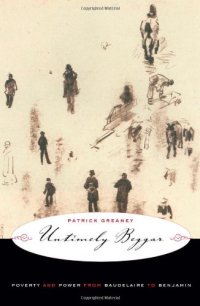
Ebook: Untimely beggar : poverty and power from Baudelaire to Benjamin
Author: Greaney Patrick
- Tags: Poverty in literature. Power (Social sciences) in literature. European literature -- 19th century -- History and criticism. European literature -- 20th century -- History and criticism. TRAVEL -- Special Interest -- Literary. LITERARY CRITICISM -- General. European literature.
- Year: 2008
- Publisher: Univ Of Minnesota Press
- City: Minneapolis
- Language: English
- pdf
This highly original book takes as its starting point a central question for nineteenth- and twentieth-century literature and philosophy: how to represent the poor?
Covering the period from the publication of Les Fleurs du Mal in 1857 to the composition of Benjamin's final texts in the 1930s, Untimely Beggar investigates the coincidence of two modern literary and philosophical interests: representing the poor and representing potential. To take account of literature's relation to the poor, Patrick Greaney proposes the concept of impoverished writing, which withdraws from representing objects and registers the existence of power. By reducing itself to the indication of its own potential, by impoverishing itself, literary language attempts to engage and participate in the power of the poor.
This focus on impoverished language offers new perspectives on major French and German authors, including Marx, Nietzsche, Mallarmé, Rilke, and Brecht; and makes significant contributions to recent debates about power and potential in thinkers such as Agamben, Deleuze, Foucault, Hardt, and Negri. In doing so, Greaney offers significant insights into modernity's intense philosophical and literary interest in socioeconomic poverty.
Covering the period from the publication of Les Fleurs du Mal in 1857 to the composition of Benjamin's final texts in the 1930s, Untimely Beggar investigates the coincidence of two modern literary and philosophical interests: representing the poor and representing potential. To take account of literature's relation to the poor, Patrick Greaney proposes the concept of impoverished writing, which withdraws from representing objects and registers the existence of power. By reducing itself to the indication of its own potential, by impoverishing itself, literary language attempts to engage and participate in the power of the poor.
This focus on impoverished language offers new perspectives on major French and German authors, including Marx, Nietzsche, Mallarmé, Rilke, and Brecht; and makes significant contributions to recent debates about power and potential in thinkers such as Agamben, Deleuze, Foucault, Hardt, and Negri. In doing so, Greaney offers significant insights into modernity's intense philosophical and literary interest in socioeconomic poverty.
Download the book Untimely beggar : poverty and power from Baudelaire to Benjamin for free or read online
Continue reading on any device:

Last viewed books
Related books
{related-news}
Comments (0)